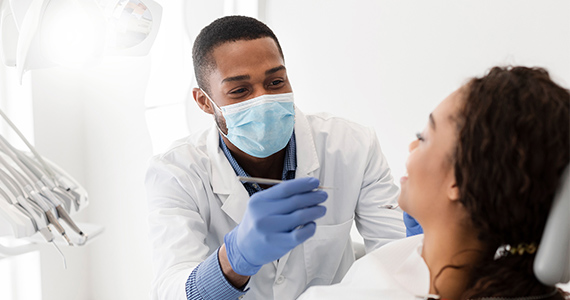Dentists: Your Partners in Oral Health
Do not wait until you have a toothache to see your dentist.

The Importance of Visiting a Dentist
They say, "an ounce of prevention is worth a pound of cure." This couldn't be more true in regard to your dental care. Of course, it's important to visit the dentist if you are experiencing dental pain, but your dentist would like to see you on a regular basis—even when you aren't in pain.
Regular dental exams play a large role in preventive healthcare and aren't completely about your teeth. Even people without any natural teeth should visit the dentist regularly for exams and to determine if any adjustments to existing dentures or partials are needed.
During a dental exam, your dentist will review your medical and dental history and evaluate for:
- Lifestyle, medical conditions and medications that can affect your teeth.
- Face, neck and mouth abnormalities.
- Bite and jaw problems (like Temporomandibular Joint Dysfunction).
- Oral cancer.
- Overall health and oral hygiene.
- Oral indications of or complications from medical issues (like diabetes or lupus).
- Risk of decay and gum disease.
- Need for tooth restoration or replacements.
- Need for fluoride.
- Denture and/or partial fit.
When to Have a Dental Visit
The American Dental Association recommends that adults have regular dental exams at intervals determined by their dentist. Following your first initial exam and treatment, your dentist will suggest the frequency of your checkups.
What to Expect During a Dental Exam
When you first arrive for your appointment, you can expect to review your health and dental history. If you usually experience dental anxiety, this would be a good time to mention it so it can be addressed from the beginning.
If you are due for X-rays, the dental hygienist may take different types of images to allow the dentist to see all parts of your teeth and supporting bone. This will help them determine if there are any otherwise concealed or hidden cavities, areas of gum disease or abnormalities.
Your dentist may refer to the images that were taken during your exam and use dental instruments to check the integrity of your teeth, look for any cavities or broken teeth and complete measurements of your gum tissues to check for gum disease.
Cleanings and Treatment
If you possess natural teeth, the next, equally important, part of your initial preventive dental visit may be a cleaning. You will usually have a cleaning during the same visit as the exam. However, if it is your first time visiting a dental office, they may schedule your cleaning for a later date after the dentist has had a chance to perform a comprehensive exam.
There are different kinds of cleanings, and the condition of your teeth and gum tissues will determine what type and frequency you need. Neglecting to have your teeth cleaned can contribute to gum disease. Severe gum disease can result in tooth and bone loss, which can cause complications if you ever need to get dentures fitted.
During your dental exam, the dentist might also identify areas where treatment is needed. Unless severe pain is involved, you will likely need to schedule a follow-up appointment with the dentist or a dental specialist to complete your treatment.
Need to find a dentist? Visit bcbsfepdental.com/FindADentist to locate a dentist in your network.
Note: The information in this document is not meant to replace the advice of your dentist or another licensed healthcare professional. Talk to your dentist for any specific dental advice.






